小学英语时态
- 格式:doc
- 大小:673.50 KB
- 文档页数:6
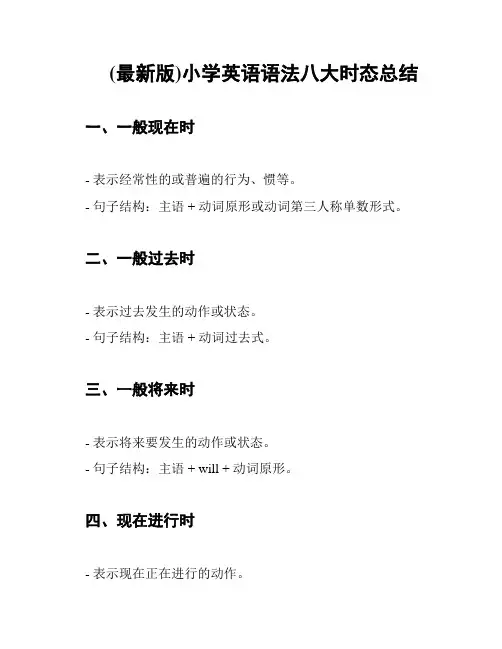
(最新版)小学英语语法八大时态总结一、一般现在时
- 表示经常性的或普遍的行为、惯等。
- 句子结构:主语 + 动词原形或动词第三人称单数形式。
二、一般过去时
- 表示过去发生的动作或状态。
- 句子结构:主语 + 动词过去式。
三、一般将来时
- 表示将来要发生的动作或状态。
- 句子结构:主语 + will + 动词原形。
四、现在进行时
- 表示现在正在进行的动作。
- 句子结构:主语 + am/is/are + 动词-ing。
五、过去进行时
- 表示过去某个时间正在进行的动作。
- 句子结构:主语 + was/were + 动词-ing。
六、将来进行时
- 表示将来某个时间正在进行的动作。
- 句子结构:主语 + will be + 动词-ing。
七、现在完成时
- 表示过去发生但与现在有关的动作或经历。
- 句子结构:主语 + have/has + 动词过去分词。
八、过去完成时
- 表示过去某个时间之前已经发生的动作。
- 句子结构:主语 + had + 动词过去分词。
以上是小学英语语法八大时态的总结,希望能对同学们的研究有所帮助。
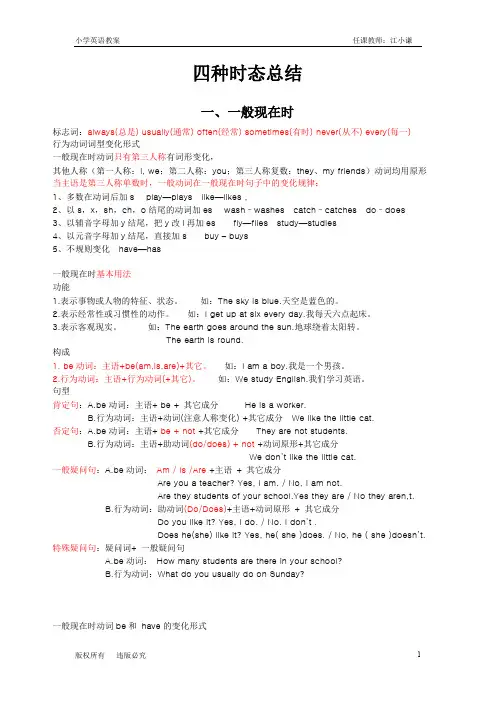
四种时态总结一、一般现在时标志词:always(总是) usually(通常) often(经常) sometimes(有时) never(从不) every(每一)行为动词词型变化形式一般现在时动词只有第三人称有词形变化,其他人称(第一人称:I, we;第二人称:you;第三人称复数:they、my friends)动词均用原形当主语是第三人称单数时,一般动词在一般现在时句子中的变化规律:1、多数在动词后加s play—plays like—likes ,2、以s,x,sh,ch,o结尾的动词加es wash–washes catch–catches do–does3、以辅音字母加y结尾,把y改i再加es fly—flies study—studies4、以元音字母加y结尾,直接加s buy – buys5、不规则变化have—has一般现在时基本用法功能1.表示事物或人物的特征、状态。
如:The sky is blue.天空是蓝色的。
2.表示经常性或习惯性的动作。
如:I get up at six every day.我每天六点起床。
3.表示客观现实。
如:The earth goes around the sun.地球绕着太阳转。
The earth is round.构成1. be动词:主语+be(am,is,are)+其它。
如:I am a boy.我是一个男孩。
2.行为动词:主语+行为动词(+其它)。
如:We study English.我们学习英语。
句型肯定句:A.be动词:主语+ be + 其它成分He is a worker.B.行为动词:主语+动词(注意人称变化) +其它成分We like the little cat.否定句:A.be动词:主语+ be + not +其它成分They are not students.B.行为动词:主语+助动词(do/does) + not +动词原形+其它成分We don’t like the little cat.一般疑问句:A.be动词:Am / Is /Are +主语+ 其它成分Are you a teacher? Yes, I am. / No, I am not.Are they students of your school.Yes they are / No they aren,t.B.行为动词:助动词(Do/Does)+主语+动词原形+ 其它成分Do you like it? Yes, I do. / No. I don’t . Does he(she) like it? Yes, he( she )does. / No, he ( she )doesn’t.特殊疑问句:疑问词+ 一般疑问句A.be动词:How many students are there in your school?B.行为动词:What do you usually do on Sunday?一般现在时动词be和have的变化形式1.动词Be 叫连系动词, 用法:第一人称单数用am,第三人称单数用is,其它人称用are。

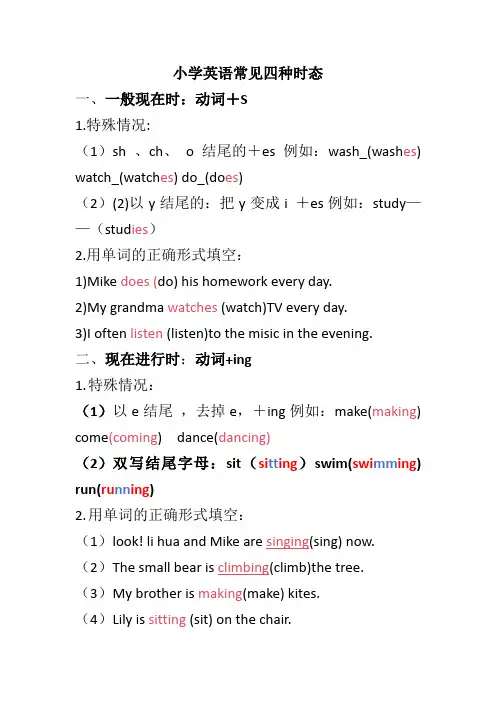
小学英语常见四种时态一、一般现在时:动词+S1.特殊情况:(1)sh 、ch、o结尾的+es例如:wash_(wash es) watch_(watch es) do_(do es)(2)(2)以y结尾的:把y变成i +es例如:study——(stud ies)2.用单词的正确形式填空:1)Mike does (do) his homework every day.2)My grandma watches (watch)TV every day.3)I often listen (listen)to the misic in the evening.二、现在进行时:动词+ing1.特殊情况:(1)以e结尾,去掉e,+ing例如:make(making) come(coming) dance(dancing)(2)双写结尾字母:sit(si tt ing)swim(swi mm ing) run(ru nn ing)2.用单词的正确形式填空:(1)look! li hua and Mike are singing(sing) now.(2)The small bear is climbing(climb)the tree.(3)My brother is making(make) kites.(4)Lily is sitting (sit) on the chair.三、一般过去时:动词+ed1.特殊情况:(1)有e结尾的,直接+ d例如:like(liked) live(lived)(2)有y结尾的,把y变成+ed 例如:cry(cried)study(studied)(3)不规则变化eat(ate) get(got) see(saw) spend(spent) do(did) teach(taught) win(won) write(wrote) buy (bought) swim(swam)go(went) meet(met) are(were) is(was) am(was)2.用单词的正确形式填空:(1).Did you water the flower yesterday.(2)L i Hua went(go) for a walk last Sunday.(3)M ike didn’t finish (finish)his homework yesterday.(4)I picked apples on the tree last month.四、一般将来时:(1)Shall/will +动词原形(shall只能用于第一人称I /we shall)(2)be going to +动词原形(表示打算做什么)be going to+地点(表示准备去)例如:1.I am going to see a film tomrrow.2There will be a party in our school3.Mike will visit his grandpa next week.。
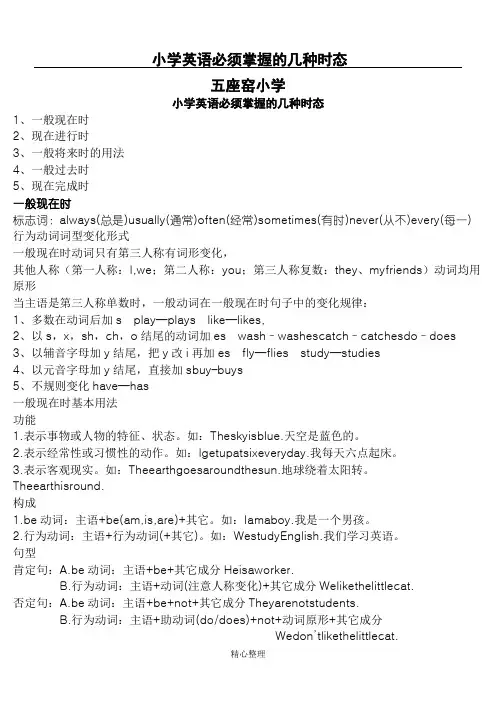
小学英语必须掌握的几种时态五座窑小学小学英语必须掌握的几种时态1、一般现在时2、现在进行时3、一般将来时的用法4、一般过去时5、现在完成时一般现在时标志词:每一)原形12、以s,x does345功能1.2.3.构成1.be动词:主语+be(am,is,are)+其它。
如:Iamaboy.我是一个男孩。
2.行为动词:主语+行为动词(+其它)。
如:WestudyEnglish.我们学习英语。
句型肯定句:A.be动词:主语+be+其它成分Heisaworker.B.行为动词:主语+动词(注意人称变化)+其它成分Welikethelittlecat.否定句:A.be动词:主语+be+not+其它成分Theyarenotstudents.B.行为动词:主语+助动词(do/does)+not+动词原形+其它成分Wedon’tlikethelittlecat.一般疑问句:A.be动词:Am/Is/Are+主语+其它成分Areyouateacher?Yes,Iam./No,Iamnot.Aretheystudentsofyourschool.Yestheyare/Notheyaren,t.B.行为动词:助动词(Do/Does)+主语+动词原形+其它成分Doyoulikeit?Yes,Ido./No.Idon’t.Doeshe(she)likeit?Yes,he(she)does./No,he(she)doesn’t.特殊疑问句:疑问词+一般疑问句A.be动词:Howmanystudentsarethereinyourschool?1.动词Be are。
2.动词注意事项1.do,does标志词:现在进行时基本结构:beis+动词Whatareyoudoing?动词的-ing形式的变化规律:1.?直接加-ingwatch—watching????clean—cleaning2.?以-y结尾的动词,直接加-ingstudy—studying??????play—playing3.?以不发音的-e结尾的动词,先去-e再加-ingmake—making??????come—coming4.?末尾只有一个元音字母和一个辅音字母的重读闭音节动词,双写末尾字母,再加-ingcut—cutting?????一般将来时的用法:表示将来某一时刻的动作或状态,或将来某一段时间内经常的动作或状态。
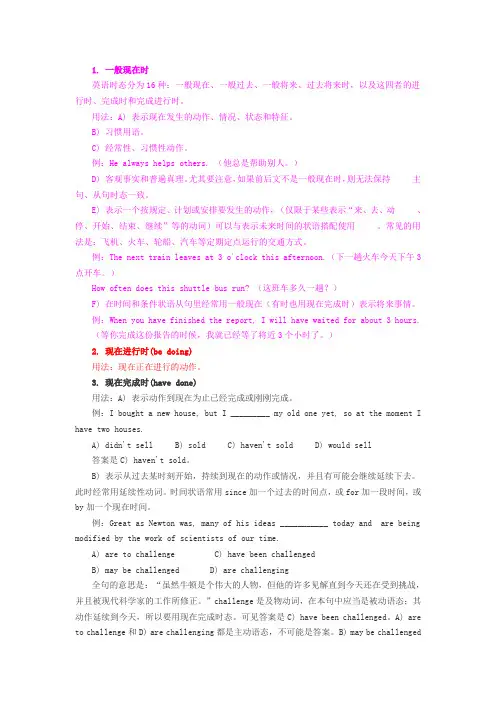
1. 一般现在时英语时态分为16种:一般现在、一般过去、一般将来、过去将来时,以及这四者的进行时、完成时和完成进行时。
用法:A) 表示现在发生的动作、情况、状态和特征。
B) 习惯用语。
C) 经常性、习惯性动作。
例:He always helps others. (他总是帮助别人。
)D) 客观事实和普遍真理。
尤其要注意,如果前后文不是一般现在时,则无法保持主句、从句时态一致。
E) 表示一个按规定、计划或安排要发生的动作,(仅限于某些表示“来、去、动、停、开始、结束、继续”等的动词)可以与表示未来时间的状语搭配使用。
常见的用法是:飞机、火车、轮船、汽车等定期定点运行的交通方式。
例:The next train leaves at 3 o'clock this afternoon.(下一趟火车今天下午3点开车。
)How often does this shuttle bus run? (这班车多久一趟?)F) 在时间和条件状语从句里经常用一般现在(有时也用现在完成时)表示将来事情。
例:When you have finished the report, I will have waited for about 3 hours.(等你完成这份报告的时候,我就已经等了将近3个小时了。
)2. 现在进行时(be doing)用法:现在正在进行的动作。
3. 现在完成时(have done)用法:A) 表示动作到现在为止已经完成或刚刚完成。
例:I bought a new house, but I _________ my old one yet, so at the moment I have two houses.A) didn't sell B) sold C) haven't sold D) would sell答案是C) haven't sold。
B) 表示从过去某时刻开始,持续到现在的动作或情况,并且有可能会继续延续下去。
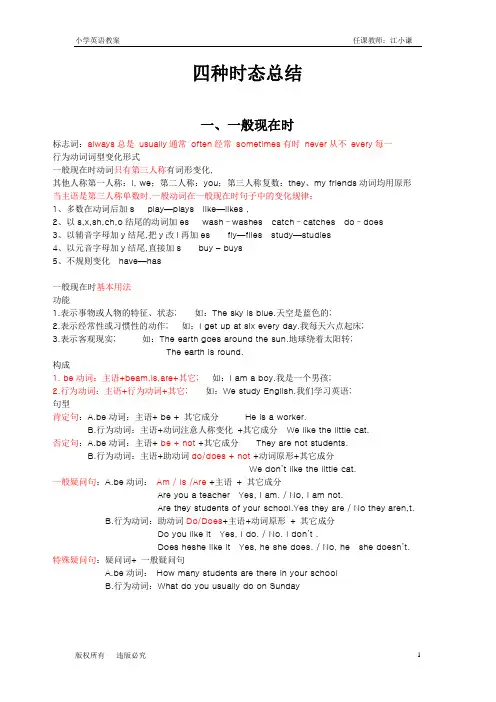
四种时态总结一、一般现在时标志词:always总是usually通常often经常sometimes有时never从不every每一行为动词词型变化形式一般现在时动词只有第三人称有词形变化,其他人称第一人称:I, we;第二人称:you;第三人称复数:they、my friends动词均用原形当主语是第三人称单数时,一般动词在一般现在时句子中的变化规律:1、多数在动词后加s play—plays like—likes ,2、以s,x,sh,ch,o结尾的动词加es wash–washes catch–catches do–does3、以辅音字母加y结尾,把y改i再加es fly—flies study—studies4、以元音字母加y结尾,直接加s buy – buys5、不规则变化have—has一般现在时基本用法功能1.表示事物或人物的特征、状态; 如:The sky is blue.天空是蓝色的;2.表示经常性或习惯性的动作; 如:I get up at six every day.我每天六点起床;3.表示客观现实; 如:The earth goes around the sun.地球绕着太阳转;The earth is round.构成1. be动词:主语+beam,is,are+其它;如:I am a boy.我是一个男孩;2.行为动词:主语+行为动词+其它;如:We study English.我们学习英语;句型肯定句:A.be动词:主语+ be + 其它成分He is a worker.B.行为动词:主语+动词注意人称变化+其它成分We like the little cat.否定句:A.be动词:主语+ be + not +其它成分They are not students.B.行为动词:主语+助动词do/does + not +动词原形+其它成分We don’t like the little cat.一般疑问句:A.be动词:Am / Is /Are +主语+ 其它成分Are you a teacher Yes, I am. / No, I am not.Are they students of your school.Yes they are / No they aren,t.B.行为动词:助动词Do/Does+主语+动词原形+ 其它成分Do you like it Yes, I do. / No. I don’t .Does heshe like it Yes, he she does. / No, he she doesn’t.特殊疑问句:疑问词+ 一般疑问句A.be动词:How many students are there in your schoolB.行为动词:What do you usually do on Sunday一般现在时动词be和have的变化形式1.动词Be 叫连系动词, 用法:第一人称单数用am,第三人称单数用is,其它人称用are;2.动词have的用法:第三人称单数用has以外,其它人称一律用have;如:注意事项 1.在英国,人们常用have got代替have,特别在疑问句和否定句中;2.当have如果不表示“有”时,构成疑问或否定句时,就借助于助动词do, does如:I have a new pen . 否:I have not a new pen. 表示有I have lunch at 12 o’clock. 否:I don’t have lunch at 12 o’clock. 表示吃二.现在进行时:标志词:now, look, listen,It’s+时间.现在进行时: 表示正在进行的、发生的动作基本结构:ambe is + 动词ingare肯定句:主语+ be动词am, are, is+ 现在分词ing+ 其他I am watching TV.否定句:主语+ be动词+ not + 现在分词ing+ 其他I am not watching TV.一般疑问句:Be动词Am, Are, Is + 主语+ 现在分词ing+ 其他Are you watching TV Yes, I am. / No, I am not.特殊疑问句:疑问词+ 一般疑问句What are you doing动词的-ing形式的变化规律:1. 直接加-ing watch—watching clean—cleaning2. 以-y结尾的动词,直接加-ing study—studying play—playing3. 以不发音的-e结尾的动词,先去-e再加-ing make—making come—coming4. 末尾只有一个元音字母和一个辅音字母的重读闭音节动词,双写末尾字母,再加-ing cut—cutting三、一般将来时的用法:表示将来某一时刻的动作或状态,或将来某一段时间内经常的动作或状态;标志词:tomorrow明天,the day after tomorrow后天,next 下一个,from now on从现在开始,in the future将来,soon不久等结构:1 beam,is ,are +going to+动词原形 2 will+动词原形“be going to+动词原形打算…”=”will+动词原形将,会…”I’m going to study tomorrow. I will study tomorrow.be going to着重于事先考虑好will 未事先考虑好----一般不用考虑肯定句:主语+ be am, are, is going to + 动词原形.主语+ will + 动词原形否定句:主语+ be am, are, is not going to + 动词原形.主语+won’t + 动词原形.一般疑问句:Be Am, Are, Is + 主语+ going to + 动词原形Will + 主语+ 动词原形特殊疑问句:疑问词+ 一般疑问句注意:will 常简略为'll,并与主语连写在一起,如:I'll,he'll,it'll,we'll,you'll,they'll;四、一般过去时标志词:yesterday昨天, last 上一个, this morning今天早上,ago以前,before 在…之前, in 2002在2002年等用法:表示过去某个时间发生的动作或存在的状态,常和表示过去的时间状语连用;也表示过去经常或反复发生的动作动词过去式变化规则:1.一般在动词末尾加-ed 如:watch-watched, cook-cooked2.结尾是e加d 如:taste-tasted3.末尾只有一个元音字母和一个辅音字母的重读闭音节,应双写末尾的辅音字母,再加-ed,如:stop-stopped4.以“辅音字母+y”结尾的,变y为i, 再加-ed,如:study-studied5.不规则动词过去式:am,is-was, are-were, do-did, see-saw, say-said, give-gave…句型:1、Be动词在一般过去时中的变化:⑴am 和is 变为was; 否定was not=wasn’t⑵are变为were; 否定were not=weren’t否定句:在was或were后加not一般疑问句:把was或were调到句首;2、行为动词在一般过去时中的变化否定句:didn’t + 动词原形如:Jim didn’t go home yesterday.一般疑问句:在句首加Did,句子中的动词过去式变回原形如:Did Jim go home yesterday 特殊疑问句:1疑问词+did+主语+动词原形如: What did Jim do yesterday2疑问词当主语时:疑问词+动词过去式如:Who went to home yesterday附录:小学常用不规则动词过去式一、不规则动词的过去式的构成1.把动词原形中的i改为a,变成过去式;如:begin—began,drink—drank,give—gave,ring—rang,sing—sang,sit—sat,s wim—swam2.把重读开音节中的i改为o,变成过去式;如:drive—drove,ride—rode,write—wrote3.改动词原形中的aw /ow为ew,变成过去式;如:draw—drew,grow—grew,know—knew,throw—threw动词show除外,show—showed4.动词原形中的e改为o,变成过去式;如:get—got,forget—forgot5.动词原形中的ee改为e,变成过去式;如:feed—fed,meet—met6.动词原形中的eep改为ept,变成过去式;如:keep—kept,sleep—slept,sweep—swept7.动词原形中的eak改为oke,变成过去式;如:break—broke,speak—spoke8.动词原形中的ell改为old,变成过去式;如:sell—sold,tell—told9.动词原形中的an改为oo,变成过去式;如:stand—stood,understand—understood10.以ought和aught结尾,且读音是〔 :t〕的过去式;如:bring—brought,buy—bought,think—thought,catch—caught,teach—taught11.以ould结尾且读音为〔ud〕的情态动词过去式;如:can—could,shall—should,will—would12.把动词原形中的o改为a,变成过去式;如:come—came,become—became13.在动词原形后加d或t变成过去式,并且发生音变;如:hear〔hi 〕—heard〔h :d〕, say〔sei〕—said〔sed〕,mean〔mi:n〕—meant 〔ment〕14.动词的过去式与动词原形一样;如:let—let,must—must,put—put,read—read〔red〕二.不规则动词表原形过去式中文释义am was 是表示存在、状态等are were 是表示存在、状态等become became 成为;变成begin began 开始break broke 打破bring brought 拿来;取来;带来build built 构筑;建造;建筑buy bought 购买;买can could 可以;能;可能;会catch caught 赶上车船等;捕获come came 来;来到cut cut 切;割;削;剪do/does did 做;干;行动draw drew 画drink drank 喝;饮drive drove 开车;驾驶eat ate 吃feel felt 感到;觉得find found 寻找;查找fly flew 飞行forget forgot 忘记;忘却get got 变得give gave 给;授予go went 去have/has had 得病;患病;有;吃;饮hear heard 听见;听说hide hid 隐藏is was 是表示存在、状态等keep kept 保持;使保持某种状态know knew 知道;了解leave left 离去;出发let let 允许;让lose lost 失去;丧失make made 使;促使;迫使;做;制作may might 可能;可以mean meant 表示……的意思;作……的解释meet met 遇见;相逢put put 放;摆;装read read /e/ 读;阅读ride rode 骑ring rang 铃响rise rose 上升run ran 跑;奔跑say said 说;讲see saw 看见send sent 发送;寄;派;遣set set 放, 置show showed 出示;给……看shut shut 关上门、盖、窗户等sing sang 唱;唱歌sit sat 坐sleep slept 睡;睡觉speak spoke 说;说话swim swam 游泳take took 搭乘;花费时间;拿走;带到teach taught 教;讲授tell told 告诉;讲述think thought 想;思考will would 将要win won 赢;获胜write wrote 书写小学英语语法词性总结一、形容词、副词的比较级和最高级的用法:当两种物体之间相互比较时,我们要用形容词或副词的比较级;当相互比较的物体是三个或三个以上时,用形容词或副词的最高级;比较级二者比较,标志词:than最高级三者以上比较,标志词:the形容词、副词的比较级和最高级的变化规律:1. 单音节形容词或副词后面直接加-er或-est tall—taller—tallest fast—faster—fastest2. 以-e结尾的单音节形容词或副词直接加-r或-st large—larger—largest nice—nicer—nicest3. 以-y结尾的形容词或副词,改-y为-i再加-er或-estbusy—busier—busiest early—earlier—earliest4. 形容词或副词是重读闭音节时,双写最后的辅音字母,再加-er或-est hot—hotter—hottest5. 多音节形容词或副词前面直接加more或most beautiful—more beautiful—most beautiful6. 以ly结尾的副词一般加more或most slowly—more slowly—most slowly7. 不规则变化good well- better-best bad badly-worse-worst little-less-leastfar-farther-further manymuch- more – most形容词、副词的比较级和最高级用法:比较级:1、形容词:物体A + am / are / is + 形容词比较级+ than + 物体BI am taller than you. This picture is more beautiful than that one.2、副词:物体A + 行为动词+ 副词比较级+ than + 物体B.He studies better than me.最高级:1、形容词:物体A + am / are / is + the + 形容词最高级+ 比较范围of + 人/物,in + 地方.I am the tallest in the class. Shanghai is one of the biggest cities in China.2、副词:物体A + 行为动词+ 副词最高级+ 比较范围of + 人/物,in + 地方.Cheetahs run fastest in the world. He studies best of us.表示两者对比相同:主语+谓语+as+形容词/副词原形+as+从句This box is as big as mine. This coat is not so/as cheap as that one.I study English as hard as my brother.英语比较级和最高级练习一1.A pig is __ than a dog.A. much heavyB. more heavierC much heavier D. more heavy2.--Which is __ season in Beijing--I think it’s spring.A. goodB. wellC. bestD. the best3. The city is becoming ______.A. more beautiful and moreB. more beautiful and beautifulC. more and more beautifulD. more beautiful and beautifuler4.Which does Alice like _____ , Chinese or ArtA. wellB. bestC. betterD. much5.The Changjiang River is one of ____ in the world.A. the longest riverB. longest riversC. the longest riversD. longer rivers6.LiMing speaks Chinese _____ better than me.A. veryB. moreC. a lot ofD. much7.There are____boys in Class Two than in Class Four.A. moreB. manyC. mostD. best8.Who has _____ oranges now, Jim, Lily or LucyA. muchB. biggestC. betterD. the most9.Mother is _____ in my family.A. busyB. busierC. the busiestD. more10.No one is _____ Lucy in the class.A. so tallest asB. as taller asC. so high asD. as tall as二写出下列形容词与副词的比较级与最高级形式:long_____ ______ wide ______ _______ fat ____ _____heavy____ ______ slow ______ _______ few____ _____brightly______ -_____ bably _____ _______ far____ _____quickly _____ ______ happy_____ -______ unhappy________三用所给词的正确形式填空:1. Of the two girls, I find Lucy the _______ clever.2. Gold黄金is ______ little useful than iron铁.3. My sister is two years _______ old than I.4. John’s parents have four daughters, and she is the _____ young child.5. The _____ cheap bags are the not usually the best ones.6. The short one is by far _______ expensive of the five.7. The boy is not so ______ interesting as his brother.8. Dick sings _____ well, she sings ______well than John, but Mary sings______wellin her class.9. She will be much ______ happy in her mew house.10. This dress is ______ that.twice, as…as…, expensive参考答案:一C D C C C D A D C D二longer longest wider widestfatter fattest heavier heaviestslower slowest fewer fewestmore brightly, most brightly worse, worstfurther,furthest more quickly, most quicklyhappier happiest unhappier unhappiest三clever lessOlder youngestCheapest the mostInteresting well, better, the bestHappier twice as expensive as二、情态动词情态动词的定义:情态动词有词义,但它不能单独作谓语,它必须和其他动词一起构成谓语;情态动词没有人称和数的变化,后加动词原形;can 能够,会may 可以shall 将,要should 应该must 必须havehasto 不得不had better 最好情态动词的用法:情态动词肯定句否定句can 主语+ can + 动词原形主语+ can + not + 动词原形may 主语+ may + 动词原形主语+ may + not + 动词原形shall 主语+ shall + 动词原形主语+ shall + not + 动词原形should 主语+ should + 动词原形主语+ should + not + 动词原形must 主语+ must + 动词原形主语+ must + not + 动词原形havehasto 主语+ havehasto + 动词原形主语+ don’tdoesn’t+havehasto + 动词原形had better 主语+ had better + 动词原形主语+ had better + not + 动词原形情态动词疑问句肯定回答否定回答can Can + 主语+动词原形Yes, ~can. No, ~can’t.may May + 主语+动词原形Yes, ~may. / Sure. No, ~may not.shall Shall + 主语+动词原形Yes, please. / All right. No, le t’s not.should Should +主语+动词原形Yes, ~should. No, ~shouldn’t.must Must + 主语+动词原形Yes, ~must. No, ~needn’t.havehasto Do does+主语+Yes, ~do does. No, ~don’t doesn’t.have to +动词原形had better ///三、名词复数规则1.一般情况下,直接加-s,如:book-books, bag-bags, cat-cats, bed-beds2.以s. x. sh. ch结尾,加-es,如:bus-buses, box-boxes, brush-brushes, watch-watches 3.以“辅音字母+y”结尾,变y为i, 再加-es,如:family-families, strawberry-strawberries4.以“f或fe”结尾,变f或fe为v, 再加-es,如:knife-knives5.不规则名词复数:man-men, woman-women, policeman-policemen,policewoman-policewomen, mouse-mice, child-children,foot-feet,tooth-teeth,fish-fish, people-people, Chinese-Chinese, Japanese-Japanese改fe为ve加s口诀1树叶半数自己黄妻子拿刀去割粮架后窜出一只狼就像小偷逃命忙2常用不规则名词复数形式foot-feet 脚man-men 男人woman-women 女人tooth-teeth 牙mouse-mice 老鼠goose-geese 鹅child-children 小孩3单复数同形fish 鱼li 里jin 斤yuan 元mu 亩sheep 羊deer 小鹿Chinese 中国人Japanese 日本人means 手段单复名词同形:中国人日本人都爱绵羊鹿和鱼.高频考点man woman 作定词修饰复数时需变为复数形式two men doctors 两位男医生many women leaders 很多女领导4只有复数形式,没有单数形式trousers 裤子clothes 衣服shorts 短裤goods 商品glasses 眼镜shoes 鞋5常用不可数名词advice 建议baggage 行李bread 面包rain 雨steel 钢gold 金sand 沙grass 草glass 玻璃oil 油paper 纸butter 黄油salt 盐beauty 漂亮change 零钱information 信息smoke water 水homework 作业cloth 布food 食品money 钱tea 茶snow 雪wealth 财富furniture 家具cotton 棉花rice 大米fruit 水果milk 牛奶四、介词口诀:介词的用法早、午、晚要用in,at黎明、午夜、点与分;年、月、年月、季节、周,阳光、灯、影、衣、冒in;将来时态in...以后,小处at大处in;有形with无形by,语言、单位、材料in;特征、方面与方式,心情成语惯用in;介词at和to表方向,攻击、位置、恶、善分;日子、日期、年月日,星期加上早、午、晚,收音、农场、值日on,关于、基础、靠、著论;着、罢、出售、偷、公、假,故意、支付、相反,准;特定时日和“一……就”,on后常接动名词;年、月、日加早、午、晚,of之前on代in;步行、驴、马、玩笑on,cab,carriage则用in;at山脚、门口、在当前,速、温、日落、价、核心;工具、和、同随with,具有、独立、就、原因;就……来说宾译主,对、有、方状、表细分;海、陆、空、车、偶、被by,单数、人类know to man;this、that、tomorrow,yesterday,next、last、one;接年、月、季、星期、周,介词省略已习惯;over、under正上下,above、below则不然,若与数量词连用,混合使用亦无关;‘beyond超出、无、不能,against靠着,对与反;besides,except分内外,among之内along沿;同类比较except,加for异类记心间;原状because of,、owing to、due to表语形容词under后接修、建中,of、from物、化分;before、after表一点, ago、later表一段;before能接完成时,ago过去极有限;since以来during间,since时态多变换;与之相比beside,除了last but one;复不定for、找、价、原,对、给、段、去、为、作、赞;快到、对、向t owards,工、学、军、城、北、上、南;but for否定用虚拟,复合介词待后言;ing型由于鉴,除了除外与包合;之后、关于、在......方面,有关介词须记全;in内to外表位置,山、水、国界to在前;五、代词的用法.形容词性物主代词my your his her its our their 名词性物主代词mine yours his hers its ours theirs反身代词myselfyourself/yourselveshimself herself itself ourselves themselves主格:一般放在句子前,做主语.宾格:一般放在动词,介词for、to、of…后.形容词性物主代词:修饰名词,放在名词前.名词性物主代词:代表名词,后不跟名词.反身代词及其一般用法反身代词表示动作回到其执行者本身用以加强语气;反身代词的分类1.第一人称单数:myself 我自己复数:ourselves 我们自己2.第二人称单数:yourself 你自己复数:yourselves 你们自己3.第三人称单数:himself 他自己herself 她自己itself 它自己复数:themselves 他们自己、她们自己、它们自己反身代词在句子中的用法1.作表语She's not herself today. 她今天跟平常真是判若两人;2.作宾语Please help yourself to some fish. 请随便吃点鱼;3.作介宾I learned English by myself. 我自学英语;4.作同位语He can do that himself. 他自己能做那件事;There be 有,表示存在;There is+单数、不可数名词There are+复数“There be” 句型结构:肯定句:“ There be+ 主语某人/ 某物+ 某地There isa boy in the room.否定句:“There be + not any+ 主语+ 某地There aren't any books on the desk. 一般疑问句:“Be is、are there +any+ 主语+ 某地“Yes , there is / are.” “No, there isn't / aren't. ”It +be谈论天气“ It's going to rain.”说到时间“It's time to go to school.”距离远近“It's far to get there.”情况程度“It's hard to learn.”六、连词的用法一、并列连词:1. and 连接单词My brother and I study in the same school.连接短语Our knowledge may come from the books and from practice.连接句子We are singing and they are dancing.2. but 但是/而是I have a pen but no pencil.or 或者Will you go there by bus or on foot3.nothing but 除了,只有I did nothing but watch it.4.or表示否则Hurry up or you will be late.5.for 表示因为He is good at math for he studies harder than others.6.still 表示后句概念由前句转折而来The weather is very cold, still we needn’t wear more clothes.7.not only…but also 不仅…而且可并列主、谓、宾、表及句子主语并列时,谓语要就近一致Not only he but also I am a teacher.8.as well as 以及,同样并列单词、短语、句子;并列主语时,动词要随前面的主语变化He works as well as he can9.either…or 既…又…,或…或…并列主、谓、宾、表及状语Either come in or go out.10.neither…nor 既不…也不并列主、谓、宾、表、状语,并列主语时,谓语就近一致Neither you nor he speaks French.12.both…and 和,既…也并列主、谓、宾及表语I can play both football and basketball.13.nor 也不,引导句子要倒装He can not speak English, nor can I.You like apples, so do I.二、从属连词:1. after 表示“时间”,在…之后After I finished the school, I became a worker in the factory.2.although/though 表示让步, “尽管”Although she is young, she knows a lot.3.as 表示时间,“当…时”,方式“象…”,原因,“由于、因为”让步,“尽管、虽然”As it was late, we must go now.4.as if/as though 表方式,“似乎、好像”He told is such a story as though he had been there before.5.as long as/so long as 表条件,“只要”As long as I am free, I’ll go to help you.6.as soon as 表时间,“一…就…”I will phone you as soon as I come back.7.because 表原因,“因为”I have to stay in bed because I am ill.8.before 表时间,“在…之前“You should think more before you do it.9.even if/ even though 表让步,“即使”You should try again even if you failed.10.hardly…when 表时间,“刚一…就”Hardly I entered the gate when the bell rang.11.if “假如”,引导条件状语从句What should I do net if the rain doesn’t stop“是否”,引导宾语从句I don’t know if he comes back or not.12.In case 表目的,“以防,以免”You should be more careful in case there is a fire.13.In order that 表目的,“为了,以便”We study hard in order that we can pass the exam.14.no matter +疑问词表让步,“无论,不管”No matter what you do, you should try your best.15.no sooner…than 表时间,“刚一…就…”No sooner had I come home than it began to rain.16.now that 表原因,“既然,因为,由于”Now that you are on duty,you should clean the classroom. 17.once 表时间,“一旦…”Once you promise , you should do it.三、其他1.since 表时间,“自从…以来”He has been in this company since he left school.表原因,“既然,由于”Since the job is dangerous, let’s do it more carefully.2.so far as/as far as 表条件,“就…而言,就…而论”As far as I know, it is easy for you to speak in English.3.so that 表目的“以便”Speak loud so that everybody can hear clearly.表结果“如此,以致”He got up so late that he missed the bus.4.than 表示比较,“比”Things were worse than we thought.5.that 无词义,引导名词性从句It is dangerous that we walk on the thin ice.引导定语从句和状语从句She hurried that she might not be late for work.6.unless 表条件,“除非,如果不”I will go to the zoo unless it rains.7.Until/till 表时间,“直到…为止”I’ll wait till he comes back.8.when 表时间,“当…时“When they got there, the train has left.9.whether “是否”引导名词性从句Whether he can some to see us is unknown.表让步,“不管/无论、是否”Whether she is ill or well, she is always happy.10.while 表时间,“当…时”While he was in Beijing, he visited the Great Wall.表让步,“尽管,既然”While I find the problems very difficult, I don’t think them insoluble.11.whenever 表时间,“无论什么时候”Whenever you meet any trouble, tell me at once.。
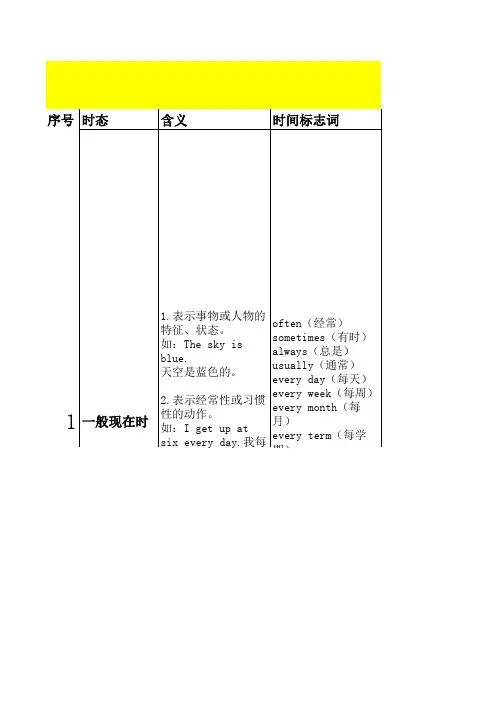
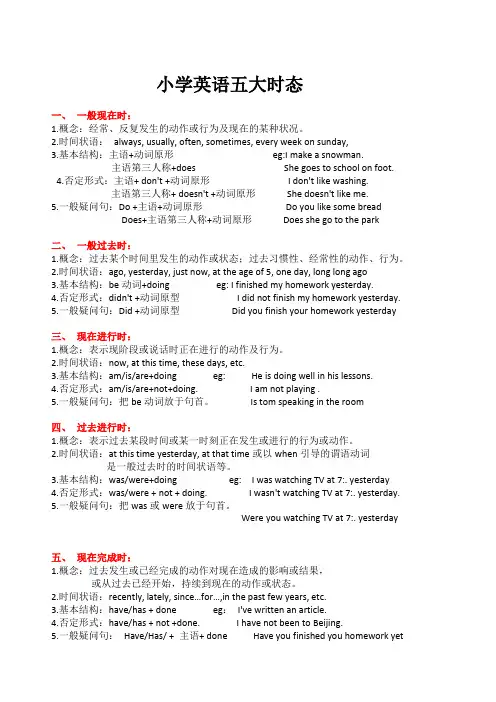
小学英语五大时态一、一般现在时:1.概念:经常、反复发生的动作或行为及现在的某种状况。
2.时间状语:always, usually, often, sometimes, every week on sunday,3.基本结构:主语+动词原形eg:I make a snowman.主语第三人称+does She goes to school on foot. 4.否定形式:主语+ don't +动词原形I don't like washing.主语第三人称+ doesn't +动词原形She doesn't like me.5.一般疑问句:Do +主语+动词原形Do you like some breadDoes+主语第三人称+动词原形Does she go to the park二、一般过去时:1.概念:过去某个时间里发生的动作或状态;过去习惯性、经常性的动作、行为。
2.时间状语:ago, yesterday, just now, at the age of 5, one day, long long ago3.基本结构:be动词+doing eg: I finished my homework yesterday.4.否定形式:didn't +动词原型I did not finish my homework yesterday.5.一般疑问句:Did +动词原型Did you finish your homework yesterday三、现在进行时:1.概念:表示现阶段或说话时正在进行的动作及行为。
2.时间状语:now, at this time, these days, etc.3.基本结构:am/is/are+doing eg: He is doing well in his lessons.4.否定形式:am/is/are+not+doing. I am not playing .5.一般疑问句:把be动词放于句首。
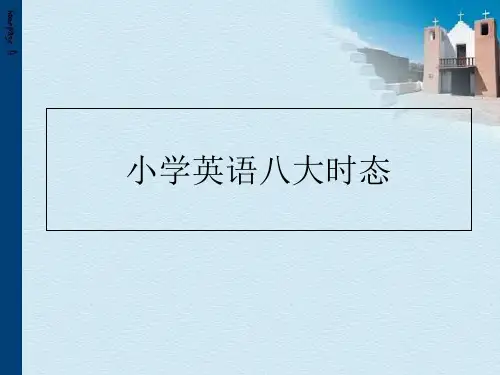
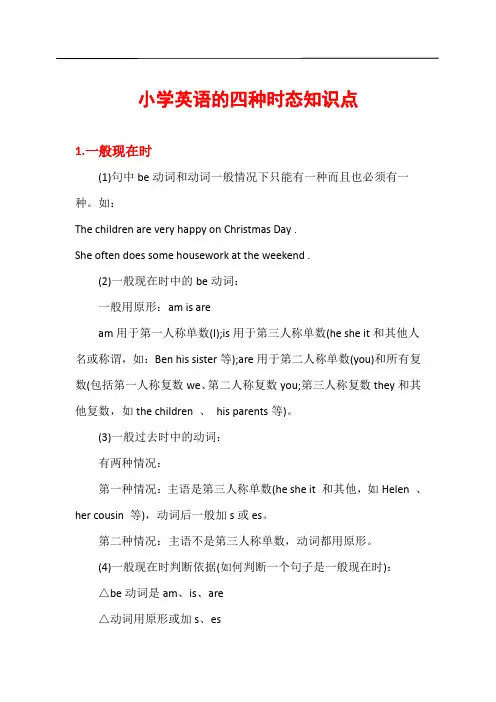
小学英语的四种时态知识点1.一般现在时(1)句中be动词和动词一般情况下只能有一种而且也必须有一种。
如:The children are very happy on Christmas Day .She often does some housework at the weekend .(2)一般现在时中的be动词:一般用原形:am is aream用于第一人称单数(I);is用于第三人称单数(he she it和其他人名或称谓,如:Ben his sister等);are用于第二人称单数(you)和所有复数(包括第一人称复数we、第二人称复数you;第三人称复数they和其他复数,如the children 、his parents等)。
(3)一般过去时中的动词:有两种情况:第一种情况:主语是第三人称单数(he she it 和其他,如Helen 、her cousin 等),动词后一般加s或es。
第二种情况:主语不是第三人称单数,动词都用原形。
(4)一般现在时判断依据(如何判断一个句子是一般现在时):△be动词是am、is、are△动词用原形或加s、es△没有时间状语或有usually、often、everyday、sometimes等不是具体的时间(5)有用的的依据:Be动词是is、am ←→名词用原形(这里包括可数名词的单数和不可数名词)Be动词是are ←→名词加s或es动词加s或es ←→主语是第三人称单数动词用原形←→主语不是第三人称单数(6)情态动词:我们现在学过的情态动词有:can、must、should、would。
情态动词后动词总是用原形。
(不受其他任何条件影响)2.一般过去时(1)句中be动词和动词一般情况下只能有一种而且也必须有一种。
如:The girls were on the grass just now .They visited my parents last weekend .(2)一般过去时中的be动词:一般用过去式:was werewas用于第一人称单数(I)和第三人称单数(he she it和其他人名或称谓,如:Ben 、his sister等);were用于第二人称单数(you)和所有复数(包括第一人称复数we、第二人称复数you;第三人称复数they 和其他复数,如the children 、his parents等)。
小学英语四种时态1.一般现在时态概念:表示经常发生的或习惯性的动作或目前的状态。
规律:一般用动词原形,当主语为第三人称单数的一般现在时,动词要加s ,es ,标志性的单词:always ,usually ,often ,sometimes 如:She usually goes to school on foot2.现在进行时态概念:表示说话时正在发生或进行着的动作。
规律:be 动词ing 形式。
标志性的单词:look ,now ,listen 如:Look ,the boy is playing football 。
3.一般将来时态概念:表示将来发生的动作或情况。
规律:be going to do ,will do 。
标志性的单词:tomorrow ,the day after tomorrow ,next Sunday … 如:Mr Brown is going to visit Hong Kong tomorrow 。
4.一般过去时态概念:表示过去某一时刻或某一时间内发生的动作或情况。
标志性的单词:yesterday ,last Monday ,before ,ago,the day before yesterday 规律:(1)一般情况动词后面加ed ; 如:worked ,cleaned ,washed ,(2)以不发音e结尾的动词加d就要以了; 如:lived ,moved ,loved(3)以辅音加y结尾的动词把y改成i再加ed ; 如:study– studied ,carry—carried(4)重读闭音节的动词要双写末尾的辅音字母再加ed; 如:stop—stopped shop—shopped skip--- skipped(5)特殊变化:见不规则动词表。
小学英语固定搭配Good night 晚安.in the morning 在早上at noon 在中午in the afternoon 在下午in the evening 在傍晚at night 在夜间have/eat breakfast 吃早饭have/eat lunch 吃午饭have/eat supper(dinner) 吃晚饭read a book 读书sing a song 唱歌have a meeting 开会have class 上课have a party 聚会have a competition 竞赛have a sleep 睡觉have a snack 吃零食have a picnic 野餐have a buffet dinner 吃自助餐draw pictures 画画listen to music 听音乐listen to the radio 听收音机learn English 学习英语learn Chinese 学习语文Learn math 学习数学tell stories 讲故事take a walk 散步ask and answer questions 问答问题fly a kite 放风筝ride a bike 骑自行车ride a horse 骑马play computer games 玩电脑游戏play games 做游戏play hide and seek 玩捉迷藏do homework 做作业watch TV 看电视take a shower 洗淋浴take a bath 洗澡open the door 开门open the window 开窗户close the door 关门close the window 关窗户paly football 踢足球/打橄榄球play basketball 打篮球play volleyball 打排球play badminton 打羽毛球play golf 打高尔夫球play bowling 打保龄球play table tennis 打乒乓球play baseball 打棒球play tennis 打网球play soccer 踢足球play hockey 打曲棍球play chess 下棋go fishing 去钓鱼go swimming 去游泳go shopping 去购物go skating 去滑冰go bike-riding/ go cycling 去骑自行车go sking 去滑雪go camping 去野营listen to the news 听新闻read the newspaper 看报read the magazine 看杂志go to school 去上学go home 回家go to the park 去公园go to the zoo 去动物园go to the library 去图书馆go to the hospital 去医院go to the cinema 去电影院go to see a film /movie去看电影get up 起床go to bed 上床go to sleep 去睡觉brush the teeth 刷牙wash the hands 洗手wash the face 洗脸wash clothes 洗衣服air the room 给房间通风make the bed 铺床sweep the floor 扫地mop the floor 拖地clean the room 打扫房间climb the trees 爬树climb the mountains 爬山cook the meals 做饭drink milk/juice/coca cola 喝牛奶/果汁/可乐play the piano 弹钢琴play the violin 拉小提琴play the drum 打鼓play the guitar 弹吉他play the xylophone 弹木琴play the flute 吹笛子play the harp 弹竖琴play the erhu 拉二胡play the zither 弹古筝play the banjo 弹班卓play the trumpet 吹小号stay at home 呆在家里at home 在家at school 在学校at church 在教堂make a cake 做蛋糕take pictures/photos 照相comb hair 梳头发have a haircut 理发go away 走开at the weekend 在周末stand up 起立sit down 坐下New year 元旦Spring Festival 春节Lantern Festival 元宵节Spring Cleaning Day 清明节Dragon Boat Festival 龙舟节International labour day 国际劳动节Trees planting day 植树节Children's day 儿童节Party's day 党的生日Army's day 建军节Teacher's day 教师节National day 国庆节Thanksgiving day 感恩节Chrismas day 圣诞节in the morning 在早上at noon 在中午in the afternoon 在下午in the evening 在傍晚at night 在夜间have/eat breakfast 吃早饭have/eat lunch 吃午饭have/eat supper(dinner) 吃晚饭read a book 读书sing a song 唱歌have a meeting 开会have class 上课have a party 聚会have a competition 竞赛have a sleep 睡觉have a snack 吃零食have a picnic 野餐have a buffet dinner 吃自助餐draw pictures 画画listen to music 听音乐listen to the radio 听收音机learn English 学习英语learn Chinese 学习语文Learn math 学习数学tell stories 讲故事take a walk 散步ask and answer questions 问答问题fly a kite 放风筝ride a bike 骑自行车ride a horse 骑马play computer games 玩电脑游戏play games 做游戏play hide and seek 玩捉迷藏do homework 做作业watch TV 看电视take a shower 洗淋浴take a bath 洗澡open the door 开门open the window 开窗户close the door 关门close the window 关窗户paly football 踢足球/打橄榄球play basketball 打篮球play volleyball 打排球play badminton 打羽毛球play golf 打高尔夫球play bowling 打保龄球play table tennis 打乒乓球play baseball 打棒球play tennis 打网球play soccer 踢足球play hockey 打曲棍球play chess 下棋go fishing 去钓鱼go swimming 去游泳go shopping 去购物go skating 去滑冰go bike-riding/ go cycling 去骑自行车go sking 去滑雪go camping 去野营listen to the news 听新闻read the newspaper 看报read the magazine 看杂志go to school 去上学go home 回家go to the park 去公园go to the zoo 去动物园go to the library 去图书馆go to the hospital 去医院go to the cinema 去电影院go to see a film /movie去看电影get up 起床go to bed 上床go to sleep 去睡觉brush the teeth 刷牙wash the hands 洗手wash the face 洗脸wash clothes 洗衣服air the room 给房间通风make the bed 铺床sweep the floor 扫地mop the floor 拖地clean the room 打扫房间climb the trees 爬树climb the mountains 爬山cook the meals 做饭drink milk/juice/coca cola 喝牛奶/果汁/可乐play the piano 弹钢琴play the violin 拉小提琴play the drum 打鼓play the guitar 弹吉他play the xylophone 弹木琴play the flute 吹笛子play the harp 弹竖琴play the erhu 拉二胡play the zither 弹古筝play the banjo 弹班卓play the trumpet 吹小号stay at home 呆在家里at home 在家at school 在学校at church 在教堂make a cake 做蛋糕take pictures/photos 照相comb hair 梳头发have a haircut 理发go away 走开at the weekend 在周末stand up 起立sit down 坐下New year 元旦Spring Festival 春节Lantern Festival 元宵节Spring Cleaning Day 清明节Dragon Boat Festival 龙舟节International labour day 国际劳动节Trees planting day 植树节Children's day 儿童节Party's day 党的生日Army's day 建军节Teacher's day 教师节National day 国庆节小学英语动词过去式agree 同意agreedask 问askedanswer 回答answeredbecome 成为becamebegin 开始beganbring 带来broughtbuy 买boughtcall 呼叫calledcarry 搬运carriedcatch 抓住caughtcheck 检查checkedclean 清洁cleanedclimb 爬climbedcome 来camecook 煮cookedcut 切cutdance 跳舞danceddo 做diddraw 画drewdrink 喝drankdrive 驾驶droveeat 吃ateenjoy 欣赏enjoyedfeel 感觉feltfly 飞fliedforget 忘记forgotfish 钓鱼fishedget 得到gotgive 给gavego 去wentgrow 成长grewhave 有hadhear 听到heardhelp 帮助helpedjump 跳jumpedkeep 保存keptknow 知道knewlearn 学习learned listen 听listenedlike 喜欢likedlook 看lookedlive 生活livedlove 喜爱lovedmake 做mademeet 遇见metmove 移动moved need 需要needed open 打开opened paint 画paintedpick 摘pickedplay 玩playedplan 计划planned practise 练习practised prefer 更喜欢preferred put 放putread 读readride 骑roderun 跑ransay 说saidsee 看sawsit 坐satskip 跳skippedspeak 说spokestart 开始startedstay 停留stayed sweep 扫sweptstudy 学习studied swim 游泳swamtalk 谈话talkedtake 带去tookteach 教taughtthank 谢谢thanked tell 告诉toldthink 想thought travel 旅游traveledtry 试trieduse 使用used wake 醒来woke walk 走路walked want 想wanted wash 洗washed watch 看watched water 浇水watered wave 挥动waved work 工作worked worry 担心worried write 写wrote小学英语可数名词复数形式1)以y结尾的专有名词,或元音字母+y 结尾的名词变复数时,直接加s变复数。
小学英语四种时态知识点加练习一、一般现在时一. 意义:表示经常发生的事情;动作或存在的状态二. 构成及变化1.be动词的变化..肯定句:主语+beam;is;are+其它..如:I am a boy.我是一个男孩..否定句:主语+ be + not +其它..如:He is not a worker.他不是工人..一般疑问句:Be +主语+其它.. 如:-Are you a student -Yes. I am. / No; I'm not. 特殊疑问句:疑问词+一般疑问句..如:Where is my bike2. 行为动词的变化..l、当主语为第一;二人称及复数时;助动词为do肯定句:主语+动词原形+其它..如:We often play basketball after school.否定句:主语+ don't+动词原形+其它..如:we don’t play basketball after school.一般疑问句:Do +主语+动词原形+其它如: Do you often play basketball after school Yes; we do. / No; we don't.特殊疑问句:疑问词+以do开头的一般疑问句如: What do you often do after school2、当主语为第三人称单数时 ;助动词为does肯定句:主语+动词三单式+其它..如: He swims well.否定句:主语+ doesn’t+动词原形+其它..如:He doesn’t swim well..一般疑问句:Does +主语+动词原形+其它..如:Does he swim wellYes; he does. / No; he doesn't.特殊疑问句:疑问词+以does开头的一般疑问句如: How does your father go to work三.第三人称单数的动词变化规则只有在第三人称为主语的肯定句中;动词才用三单式1多数动词直接加s: runs gets likes collets takes plays climbs…….2结尾是s; x; sh; ch; o;前为辅音字母; 结尾加es : watches teaches goes does washes crosses mixes brushes3动词末尾y前为辅音:将y改为i加es: study→studies fly→flies carry→carries cry→cries但在y前如果为元音则直接加s: buys says四.时间标志:always ; usually ; often ; sometimes ;every…一般现在时练习题I.用下列单词的适当形式填空1.We often___________play in the playground.2.He _________get up at si x o’clock.3.__________you _________brush your teeth every morning4.What________________do he usually________________do after school5.Danny ________________study English; Chinese; maths; science and Art at school.6.Mike sometimes __________go to the park with his sister.7.At eight at night; she __________watch TV with his parents.8.________ Mike________read English every day9.How many lessons_________your classmates________have on Monday10.What time_________his mother_________do the houseworkII.改句子1.Do you often play football after school 改为肯定句2.I have many books.改为否定句3.Gao Shan’s sister likes playing table tennis 改为否定句4.She lives in a small town near New York.改为一般疑问句5.I watch TV every day.改为一般疑问句6.We have four lessons.改为否定句7.Nancy doe sn’t run fast 改为肯定句二、现在进行时一、概念现在进行时表示说话时正在进行或发生的动作;也可表示当前一段时间内的活动或现阶段正在进行的动作..结构:be动词 am / is / are + doing二、现在分词的构成:1.大多数动词后可在动词后直接加-ing.Eg: carry-carrying;catch-catching;drink-drinking; enjoy-enjoying hurry-hurrying ;do-doing ; read-reading ; think-thinking2. 如果动词以-e结尾;则去掉-e;再加-ing;如come-coming ; have-having ; make-making;ride-riding;write-writing;take-taking;use-using.3. 如果动词只有一个元音字母;而其后跟有一个辅音字母时;将此辅音字母双写;再加-ing 如:hit-hitting;let-letting; put-putting;run-running;sit-sitting.4. 如果动词有两个音节;且重音在第二个音节上;则末尾的辅音字母须双写;再加-ing; 如: forget-forgetting;prefer-preferring;upset-upsetting.试比较benefit/benfiting;differ/differing;profit/profiting;这些词的重音在第一个音节上;因此其末尾的辅音字母不双写.5. 以-ic 结尾的动词;应先把-ic 变为-ick;再加-ing;eg: panic/panicking;picnic/picnicking;但 lie/lying ;die/dying;tie/tying是特殊变化要记住.三、句型结构:1.现在进行时的肯定形式、否定形式、疑问形式及其回答;所有变化都体现在助动词 be is / am / are 上.1现在进行时的肯定形式:主语+beam/ is/are+doing+其他成分I am singing . They are writing .2现在进行时的否定形式:主语+beam/ is/are+not +doing+其他成分I am not singing . They aren’t writing .3一般疑问句及回答:beam/ is/are+ 主语+doing+其他成分Am I singing Yes ;you are . / No ;you aren’t .Are they writing Yes ;they are . / No ;they aren’t .4特殊疑问句及回答:特殊疑问词+beam/ is/are+主语+doing+其他成分What are you doing We are playing 要求就提问内容具体回答.2. 缩写形式如下:I am---I’m You are---You’re He is---He’s She is---She’sIt is---It’s We are---We’re They are---They’re3.说明: 不是所有动词都能用现在进行时态的;如:see、like、want、know 等动词往往都不用进行时态.四.用法:1.表示现在指说话人说话时正在发生的事情.往往与 now;at the moment;at present;just now;listenlook等副词连用;以示强调.We are waiting for you. What are you doing Some one’s knocking at the door.2.正在进行着的动作可视为未完成的动作:He’s talking to his friends in the classroom.可用still 一词强调动作的持续性He’s still talking to his friends in the classroom.3. 表示长期的或重复性的动作;说话时动作未必正在进行.Mr. Black is writing another article.Don’t take that book away. Your father’s using it.She is learning piano under Mr. Black.4.现在进行时可用来表示不会长期发生的动作或情况;或被认为在短期内正在进行的动作或存在的情况:What’s your brother doing these days He’s studying English at Oxford University.5.现在进行时也可以用来表示当前的动向:People are becoming more and more beautiful these days.6. 表示渐变的动词有:become;turn;get;grow;run;go;begin等.The leaves are turning brown.It’s getting colder and colder.7.与always;constantly;forever 等词连用;表示反复发生的动作或持续存在的状态;往往带有说话人的主观色彩.You are always changing your mind.8. 现在进行时表将来现在进行时以及 be going to可以表示为将来安排好的活动和事件We’re spending next winter in China. 用arrive;come;go;leave 等动词的现在进行时描写行程安排;也通常有“将到达”和“将离去”的意思:He’s arriving tomorrow morning.9.当现在进行时表示某事发生的次数过多时;则有时含有抱怨;讨厌;赞扬等的意思:He is al ways singing at night;and we can’t fall asleep late at night.现在进行时练习题一.用现在进行时完成下列句子:1. ______you__________fly a kite Yes;_______.2. ______you___________sit in the boat3. ______he_____________talk with me4. We_______________play football now.5. What_________you__________do6. I_____________sing an English song.7. What________he____________mend8. He______________mend a car.9. These boys _________ play tennis on the playground.10. My mother______________ cook in the kitchen.11. We can’t help you;because we ____________ have classes.12. ________ the boy ___________ write his homework13. Look These butterflies _________ fly in the sky.14. Listen The girl ___________ sing in the next room.15. The naughty boy __________ swim in the river.二.选择1. Look. Lucy is_____ a new bike today.A. jumpingB. runningC. riding D takeing2. The children _____ football.A. is playingB. are playingC. play theD. play a3. They ______TV in the evening. They do their homework.A. are watchingB. can’t watchingC. don’t watchD. don’t watching4. Listen She____ in the classroom.A. is singingB. sing C .to sing D. is sing5. ______are you eating I’m eating ______ meat.A. What;someB. Which;anyC. Where;notD. What;a6. Is she ____ somethingA. eatB. eatingC. eattingD. eats7.My dictionary ___;I have looked for it everywhere but still___ it.A. has lost;don’t findB. is missing;don’t findC. has lost;haven’t foundD. ismissing;haven’t found.8..Having a computer for personal use is no easy task because technology _______ sorapidly.A. is changingB. has changedC. will have changedD. will change9. The building_______ ;I can’t stand the noise.A. was being builtB. is builtC. is being builtD. builds10. I can’t catch up with the fashion;b ecause the clothes style_______ all the time.A. has changedB. is changedC. is changingD. changed一般将来时一、概念:表示将要发生的动作或存在的状态及打算、计划或准备做某事..句中一般有以下时间状语:tomorrow; next dayweek; month; year…;soon; the day after tomorrow后天等..二、基本结构:①be going to + do;②will+ do.三、否定句:在be动词am; is; are后加not或情态动词will后加not成won’t..例如:I’m going to have a picnic this afternoon.→ I’m not going to have a picnic this afternoon.四、一般疑问句: be或will提到句首;some改为any; and改为or;第一二人称互换..例如:We are going to go on an outing this weekend. → Are you going to go on an outing this weekend五、对划线部分提问..一般情况;一般将来时的对划线部分有三种情况..1. 问人..Who 例如:I’m going to New York soon. →Who’s going to New York soon.2. 问干什么..What … do.例如: My father is going to watch a race with me this afternoon. →What is your father going to do with you this afternoon.3. 问什么时候..When.例如:She’s going to go to bed at nine. →When is she going to bed六、同义句:be going to = willI am going to go swimming tomorrow明天. = I will go swimming tomorrow.一般将来时练习题1. 我打算明天和朋友去野炊..I_____ _______ _________ have a picnic with my friends.I ________ have a picnic with my friends.2. 下个星期一你打算去干嘛我想去打篮球..What ________ ________ _________ _________ _________ next Monday I _______ ______ _____ play basketball.What _________ you do next Monday I ________ play basketball.3. 你妈妈这个周末去购物吗是;她要去买一些水果.._____ your mother _______ ________ go shopping this ___________Yes; she _________. She ______ ________ __________ buy some fruit.4. 你们打算什么时候见面..What time _______ you _________ __________ meet改句子..5. Nancy is going to go camping.改否定Nancy ________ going to go camping.6. I’ll go and join them.改否定I _______ go ______ join them.7. I’m going to get up at 6:30 tomorrow.改一般疑问句________ _______ ________ to get up at 6:30 tomorrow8. We will meet at the bus stop at 10:30.改一般疑问句_______ ________ meet at the bus stop at 10:30.9. She is going to listen to music after school.对划线部分提问________ _______ she ________ ________ _________ after school10. My father and mother are going to see a play the day after tomorrow.同上_________ _________ going to see a play the day after tomorrow.用所给词的适当形式填空..11. Today is a sunny day. We ___________________ have a picnic this afternoon.12. My brother _______________ go to Shanghai next week.13. Tom often ______________go to school on foot. But today is rain. He ______________ go to school by bike.14. What do you usually do at weekends I usually __________ watch TV and ____________catch insects.15. It’s Friday today. What _____she _________ do this weekend She ______________ watch TV and _____________ catch insects.一般过去时I. 一般过去时的概念一般过去时表示过去某个时间发生的动作或存在的状态..常和表示过去的时间状语连用..如:last year/week/night/month; yesterday等..例如:①I saw him in the street yesterday. 昨天我在街上看见他了..②Li Mei always went to school on foot last year. 去年李梅总是步行上学..II. 一般过去时的构成动词过去式的构成:1规则动词过去式的构成有四条规则:①一般在动词原形末尾直接加上-ed..如:look-looked..②以不发音的字母e结尾的动词;去e再加-ed..如:live-lived..③末尾只有一个辅音字母的重读闭音节;先双写这个辅音字母;再加-ed..如:stop-stopped..④末尾是辅音字母+y结尾的动词;先变y为i;然后再加-ed..如:study-studied..2不规则动词的过去式需特殊记忆..amis-was; are-were; go-went; come-came; take-took; have has-hadread-read; make-made; see-saw; go-went; eat-ate;III. 一般过去时的几种句型肯定句结构为:主语+动词的过去式+其它..如:He went to the toy store yesterday. 他昨天去玩具店了..否定句结构为:主语+did not didn't+动词原形+其它..如:He didn't go to the toy store yesterday. 他昨天没去玩具店..一般疑问句的构成:Did+主语+动词原形+其它如:1 -Did you go to Beijing last week -Yes; we did. No; we didn't.2 -Did you meet the businessman before -No; I didn't. Yes; I did.特殊疑问句的构成:疑问词+did+主语+动词原形+其它如:1 -What did you do last night -I did my homework.2 -Where did you go last week -I went to Shanghai with my parents.小学阶段要掌握的几个动词的过去式:watched TV; washed clothes; played football; cleaned the room;visited grandparents; went to a park; went swimming; read a book; went fishing; went hiking; learned Chinese; sang and danced; took pictures; climbed a mountain; ate good food; bought presents; roweda boat; saw elephants; went skiing; went ice-skating.一般过去时练习题I.用所给的动词的适当形式填空..⒈He __visited____visit the Great Wall last year.2.We____had___have a good time yesterday.3.We often ____went__go to school by bus last year.4.I __lived__livein the village when I was a child.5.Mike__saw__see a big tiger in the nature park last year.6.Sam____did___ do the housework yesterday.7.___Did_do you ___enjoy__enjoy yourself yesterday8.-__Did__doyou ___play__play the violin in the afternoon yesterday-No; I didn't. I___drew___drawsome pictures there.9.. I ___ate___ eat a big pizza yesterday.10.There__were_____ be many sheep on the farm last year.II.选择填空1. She watered the flowers ________.A tomorrowB sometimesC yesterday morning2.What ____ Mike do last weekendA doB doesC did3. I ___ my room last Sunday.A cleanedB cleanC am cleaning4. I often help my mother _____ housework.A doesB didC do5. _____ you _____ TV last night .A Do; watchB Did; watchC Did; watched6.---Did your father write an e-mail yesterdayA Yes; he did.B Yes; he doesC No; he don’t7.They _____ on a trip in February ;2007.A are goingB goingC went8.We’re going to _____ mountains tomorrow .A climbB climbedC climbingIII.根据句意;填上合适的单词..1.-Where you go on your holiday - I a park. 2.- did you do on your holiday - I presents.3.- did you go there I I went plane.4.- What did you learned ;learn last Monday5.- Did you a boat yesterday课后练习一、写出下列动词的第三人称单数drink ________ go _______ stay ________ make ________look _________ have_______ pass_______ carry ____come________ watch______ plant_______ fly ________study_______ brush________ do_________ teach_______二、写出下列动词的现在分词play________ run__________ swim _________make__________go_________ like________ write________ ski___________ read________ have_________ sing________ dance_________put_________ see________ buy _________ love____________live_______ take_________ come ________ get_________stop_________ sit ________ begin________ shop___________三、写出下列动词的过去式is\am_________ fly_______ plant________ are ________drink_________ play_______ go________ make ________does_________ dance________ worry________ ask _____taste_________ eat__________ draw________ put ______throw________ kick_________ pass_______ do ________四、用行为动词的适当形式填空1. He _________ live in Wuxi two years ago.2. The cat ________ eat a bird last night.3. We _______ have a party last Halloween.4. Nancy ________ pick up oranges on the farm last week.5. I ________ make a model ship with Mike yesterday.6. They ________ play chess in the classroom last PE lesson.7. My mother _______ cook a nice food last Spring Festival.8. The girls ________ sing and _______ dance at the party.9. She and I ________take a walk together every evening.10. There ________be some water in the bottle.11. Today is a sunny day. We ___________________ have a picnic this afternoon.12. My brother _______________ go to Shanghai next week.13. Tom often ___________go to school on foot. But today is rain. He ___________ go to school by bike.14. What do you usually do at weekends I usually __________ watch TV and ____________catch insects15. It’s Friday today. What _____she _________ do this weekend She ______________ watch TV and _____________ catch insects.16. She _______go to school from Monday to Friday.17. Liu Tao _______do not like PE.18. The child often _______watch TV in the evening.19. Su Hai and Su Yang _______have eight lessons this term.20. -What day _______be it today-It’s Saturday.21.The boy __________________ drawa picture now.22. Listen .Some girls _______________ singin the classroom .23. My mother _________________ cook some nice food now.24. What _____ you ______ do now25. Look . They _______________ have an English lesson .26.They ____________not ;water the flowers now.27.Look the girls ________________dance in the classroom .28.What is our granddaughter doing She _________listen to music.29. It’s 5 o’clock now. We _____________havesupper now30.______Helen____________wash clothes Yes ;she is .31. It _____ be the 2nd of November yesterday. Mr White ________ go to his office by car.32. Gao Shan ________ put the book on his head a moment ago.33. Don’t ______ the house. Mum _______ it yesterday. clean34. What ____ you ______ just now I _______ some housework. do35. They _________ make a kite a week ago.36. I want to ______ apples. But my dad _______ all of them last month. pick37. _______ he ______ the flowers this morning Yes; he _____. water38. She ____ be a pretty girl. Look; she _____ do Chinese dances.39. The students often _________ draw some pictures in the art room.40.What ______ Mike do on the farm He ________ cows. milk五、用be动词的适当形式填空1. I ______ watch a cartoon on Saturday.2. Her father _______ read a newspaper last night.3. We _________ to zoo yesterday; we _____ to the park. go4. ______ you _______ visit your relatives last Spring Festival5. ______ he _______ fly a kite on Sunday Yes; he ______.6. Gao Shan _______ pull up carrots last National Day holiday.7. I ____________ sweep the floor yesterday; but my mother ______.8. What ______ she _______ find in the garden last morning She __________ find a beautiful butterfly.六、句型转换1. Su Hai took some photos at the Sports day.否定句:________________________________________________一般疑问句:____________________________________________肯、否定回答:__________________________________________2. Nancy went to school early.否定句:________________________________________________一般疑问句:____________________________________________肯、否定回答:__________________________________________3.He is playing the football in the playground .对划线部分进行提问_________________________________________________________________4.Tom is reading books in his study . 对划线部分进行提问_________________________________________________________________5. It was exciting.否定句:________________________________________________一般疑问句:____________________________________________ 肯、否定回答:__________________________________________七、按照要求改写句子1. Daniel watches TV every evening.改为否定句___________________________________________________2. I do my homework every day.改为一般疑问句;作否定回答____________________________________________________________________________________3. She likes milk.改为一般疑问句;作肯定回答___________________________________________________________________________________4. Amy likes playing computer games.改为一般疑问句;作否定回答____________________________________________________________________________________________5. We go to school every morning.改为否定句_______________________________________________________6. He speaks English very well.改为否定句___________________________________________________7. I like taking photos in the park.对划线部分提问________________________________________________________ 8. John comes from Canada.对划线部分提问___________________________________________________9. She is always a good student.改为一般疑问句;作否定回答________________________________________________________________________________________10. Simon and Daniel like going skating.改为否定句___________________________________________________八、改错划出错误的地方;将正确的写在横线上1. Is your brother speak English __________________2. Does he likes going fishing __________________3. He likes play games after class. __________________4. Mr. Wu teachs us English. __________________5. She don’t do her homework on Sundays. _________________九、填空1. 我打算明天和朋友去野炊..I_____ _______ _________ have a picnic with my friends.I ________ have a picnic with my friends.2. 下个星期一你打算去干嘛我想去打篮球..What ________ ________ _________ _________ _________ next MondayI _______ ______ _____ play basketball./ What _________ you do next MondayI ________ play basketball.3. 你妈妈这个周末去购物吗是;她要去买一些水果.._____ your mother _______ ________ go shopping this ___________Yes; she _________. She ______ ________ __________ buy some fruit.4. 你们打算什么时候见面..What time _______ you _________ __________ meet。
小学英语五种时态一、一般现在时:1.概念:(1)经常、反复发生的动作或行为及现在的某种状况。
(2)客观真理,客观存在,科学事实2.时间状语: always, usuall y, often, someti mes, everyweek (day, year, month…),once a week, on Sunday s,3.基本结构:主语+be(am/is/are)/动原(主语为第三人称单数或不可数名词时,动词上要加(e)s )4.否定形式:主语+am/is/are+not;主语+don't /doesn't +动原(前面有助动词do,does时,要把动词还原)5.一般疑问句:be (am/is/are)+主语do /does +主语+动原(前面有助动词do,does时,要把动词还原)6.例句:. It seldom snowshere. 这里很少下雪。
Watergets clean.水变清澈了He is always readyto help others. 他总是乐于助人。
Action speaks louder than words.事实胜于雄辩。
The moon move roundthe earth。
月亮绕着地球转。
二、一般过去时:1.概念:①过去某个时间里发生的动作或状态;②过去习惯性、经常性的动作、行为。
2.时间状语:ago, yester day, the day before yester day(前天), last week(year, night, month…),in1989, just now, at the age of 5,one day, long long ago, once upon a time, etc.3.基本结构:①主语+ was/were ②主语+动词过去式(v-ed)4.否定形式:①主语+ was/were+not ②主语+didn't+动原5.一般疑问句:①Was/Were+主语…②Did+主语+动原…6.例句:She oftencame to help us in thosedays. (过去一段时间内)I didn't know you were so busy. (过去某个时间点)三、一般将来时:1. 概念:表示将要发生的动作或存在的状态及打算、计划或准备做某事。
小学英语时态和语法总结一、现在时态(Present Simple)1. 用法:表示经常性的动作、习惯、常态、真理等。
2. 构成:主语 + 动词原形(第三人称单数要加-s)3. 特殊用法:a) 认真、真诚的祈使句:Be satisfied with your life.b) 当现在是将来动作或安排:My plane leaves in one hour.c) 描述本能或内在特征:The earth moves around the sun.d) 当主语是it,后面是名词从句时:It seems that she knows the answer.e) 表示世界真理或普遍真理:The sun rises in the east.4. 注意事项:a) 第三人称单数动词要加-s。
b) 当主语是第一或第二人称,或者是复数,动词不变。
二、现在进行时态(Present Continuous)1. 用法:表示现在正在进行的动作。
2. 构成:主语 + am / is / are + 动词的现在分词(-ing形式)3. 特殊用法:a) 表示近期打算:I am going to the cinema tonight.b) 表示变化发展的情况:The weather is getting worse.c) 表示接下来安排好的未来动作:I am seeing a movie tomorrow.d) 表示抱怨或责备:You are always misbehaving!4. 注意事项:动词的现在分词的构成规则需要注意。
如:study - studying, play - playing, run - running。
第1页/共5页三、过去时态(Past Simple)1. 用法:表示过去发生的动作或状态。
2. 构成:主语 + 动词过去式3. 特殊用法:a) 表示“过去经常性的动作”:I often walked to school when I was young.b) 表示“在过去的某个时间发生的动作”:I visited my grandparents last weekend.c) 用于条件句中,表示假设:If I had enough money, I would buya car.4. 注意事项:动词的过去式需要根据规则进行变化,如:study - studied, play - played, run - ran。
四大时态复习1. 一般现在时(1)一般现在时的构成(肯定句)☆ be动词:主语+be(am,is,are)+其它。
如:I am a boy.我是一个男孩。
☆行为动词:主语+行为动词(+其它)。
如:We study English.我们学习英语。
☆当主语为第三人称单数(he, she,it)时,要在动词后加"-s"或"-es"。
如:Mary likes Chinese. 玛丽喜欢汉语。
(2)一般现在时的变化☆ . be动词的变化。
[否定句]:主语+ be + not +其它。
如:He is not a worker.他不是工人。
[一般疑问句]:Be +主语+其它。
如:-Are you a student-Yes. I am. / No, I'm not.[特殊疑问句]:疑问词+一般疑问句。
如:Where is my bike☆ .行为动词的变化。
[否定句]:主语+ don't( doesn't ) +动词原形(+其它)。
如:I don't like bread.当主语为第三人称单数时,要用doesn't构成否定句。
如:He doesn't often play.[一般疑问句]:Do( Does ) +主语+动词原形+其它。
如:- Do you often play football- Yes, I do. / No, I don't.当主语为第三人称单数时,要用does构成一般疑问句。
如:- Does she go to work by bike- Yes, she does. / No, she doesn't.[特殊疑问句]:疑问词+一般疑问句。
如:How does your father go to work*动词+s的变化规则1.一般情况下,直接加-s,如:cook-cooks, milk-milks2.以s. x. sh. ch. o结尾,加-es,如:guess-guesses, wash-washes, watch-watches, go-goes3.以“辅音字母+y”结尾,变y为i, 再加-es,如:study-studies2.现在进行时(1)一般现在时的构成: be(am,is, are)+ 动词的ing形式。
小学英语时态(总5页) -CAL-FENGHAI.-(YICAI)-Company One1-CAL-本页仅作为文档封面,使用请直接删除时态小学阶段一共学了四种时态,分别是:一般现在时,一般将来时,现在进行时,一般过去时。
1、一般现在时表示现在的习惯动作,即指现在经常发生的动作,一般现在时常用来表示现在时间里某种动作的经常性和习惯性。
它常与表示程度或频度的词连用,如:often(经常) , usually(通常,一般) , sometimes(有时) , always(总是,一直) , never(从不)如:I often go to school on foot. My father works in a school. Mike watches TV every day.主语是第三人称单数时,势单力薄,需要一个帮手,在动词上给它加上丝丝(s或es)力吧!英语动词的现在时与原形同形。
但当主语是第三人称单数时,须在词尾加-s或 -es。
Her mother works in a hospital. Amy often goes to school by bike. Mr. Liu teaches us English.加-es 的动词必须是以“sh , ch , o ”等字母结尾的。
如:watches , teaches , goes , washes2、一般将来时表示在将来会发生的事或动作。
它常与表示将来的时间连用,如:tomorrow , next week , next year , this morning , this afternoon , this evening, soon,注意☆ 一般将来时小学阶段主要学了两种结构:①be going to + 动词的原形 / 地点②will + 动词的原形例句:I’m goi ng to go shopping this afternoon. You will see many birds in the sky.3、现在进行时表示说话时正在进行的动作或现阶段一直在进行的动作。
now listen look特征词主人正要干大事,要找比比(be动词)当保镖,保镖出门不简单,后面带着英英(ing)跟屁虫它的构成是:be的现在时形式(am , is , are)加动词的ing形式。
如:What are you doing What are they doing They’re swimming. Look, Amy is reading an English book.☆注意☆ 动词的ing形式的构成规则:一般的直接在后面加上ing , 如doing , going , working , singing , eating② 以e 结尾的动词,要先去e再加ing ,如having , writing③ 双写最后一个字母的(此类动词极少)有:running , swimming , sitting , getting4、一般过去时主要用来表示在特定过去时间中一次完成的动作或一度存在的状态,也可表示过去的习惯动作。
它与现在时间不发生关系,它表示的动作或状态都已成为过去,现已不复存在。
它经常与表示过去的时间连用。
如:I went to a park yesterday. I read a book last night. I watched TV yesterday evening.☆注意☆一般过去时主要体现在动词的形式要用过去式,动词的过去式的构成规则有:A、规则动词一般直接在动词的后面加ed ;如worked , learned , cleaned , visited②以e结尾的动词直接加d ;如lived , danced , used以辅音字母加y结尾的动词要改y为i再加ed (此类动词较少)如study –studied carry – carried worry – worried (play、stay除外)④ 双写最后一个字母(此类动词较少)如stoppedB、不规则动词(此类词并无规则,须熟记)小学阶段要记住以下动词的原形和过去式:sing – sang , eat – ate , see – saw , have – had , do – did , go – went , take – took , buy – bought , get – got , read – read , fly –flew , am/is – was , are – were , say – said , leave – left , swim – swam , tell – told , draw – drew , come – came , lose –lost , find – found , drink – drank , hurt – hurt , feel – felt特征词ago, yesterday , last小学阶段不规则动词全表Infinitive Pasttense Infinitive Past tense1. am, is was2.keep k e pt3. are were4.let let5. become bec a me6. make ma d e7. begin beg a n 8.meet m e t9. bite b i t 10.put put11. blow bl e w 12.read read13. buy b ough t 14.ride r o de15. catch c augh t 16. run r a n17. come c a me 18.say s ai d19. cost cost 20.see s aw21. cut cut 22.sing s a ngd u g 24. sit s a td i d 26.sleep sl e pt27. draw dr e w 28.speak sp o ke29. drink dr a nk 30. sweep sw e pt31. eat ate32.take t oo kf e ll t augh t35. feed f e d 36.tell t o ldf e lt th ough t39. fly fl ew40.throw thr e wforg o t underst oo d43. get g o t 44.give g a ve45. wake w o ke 46.go went47. wear w ore 48.grow gr e w49. win w o n 50. have/has h a d 51. write wr o te 52.know kn e wsang 54. see sawgot flewsaid leftswam 60. lose lostfound 62. hurt hurt(一)一般现在时用法专练:一、写出下列动词的第三人称单数drink________go_______stay________make________look_________have_______pass_______carry____come________watch______plant_______fly________study_______brush________do_________teach_______二、用括号内动词的适当形式填空。
often________(have)dinner at home.and Tommy_______(be)in Class One.(not watch)TV on Monday.(not go)to the zoo on Sunday.(like)the World Cup?often_______(do)on Saturdays?parents_______(read)newspapers everyday?girl_______(teach)us English on Sundays.and I________(take)a walk together every evening.(be)some water in the bottle.(like)cooking.(have)the same hobby.aunt_______(look)after her baby carefully.always_______(do)your homework well.(be)ill. I’m staying in bed.(go)to school from Monday to Friday.Tao_______(do)not like PE.child often_______(watch)TV in the evening.and SuYang_______(have)eight lessons this term.20.-What day_______(be)it today?-It’s Saturday.(二)现在进行时专项练习:一、写出下列动词的现在分词:play________ run__________ swim _________make__________go_________ like________ write________ _ski___________read________ have_________ sing ________ dance_________put_________ see________ buy _________ love____________live_______ take_________ come ________ get_________stop_________ sit ________ begin________ shop___________二、用所给的动词的正确形式填空:boy __________________ ( draw)a picture now.2. Listen .Some girls _______________ ( sing)in the classroom .3. My mother _________________ ( cook )some nice food now.4. What _____ you ______ ( do ) now?5. Look . They _______________( have) an English lesson .____________(not ,water) the flowers now.! the girls ________________(dance )in the classroom .is our granddaughter doingShe _________(listen ) to music.9. It’s 5 o’clock now. We _____________(have)supper now (wash )clothesYes ,she is .(三)将来时专项练习用所给词的适当形式填空。